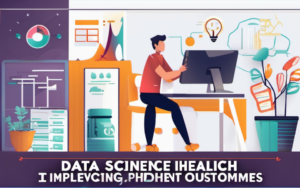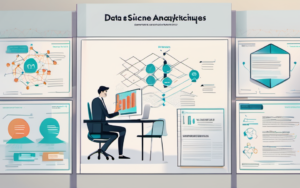The field of Data Science is rapidly evolving, driven by the exponential growth of data and the increasing adoption of artificial intelligence (AI). As we look towards 2028, it’s clear that the role of data scientists will continue to transform, demanding a blend of technical expertise, domain knowledge, and ethical awareness.
The Evolving Landscape of Data Science
The landscape of Data Science is constantly changing, shaped by technological advancements and evolving business needs. Here are some key trends that will impact the future of data science:
The Rise of Automation and AI
Automation and AI are transforming the way data is collected, analyzed, and interpreted. Tools like automated machine learning platforms are making it easier for businesses to build and deploy AI models, potentially reducing the need for highly specialized data scientists in some areas. However, this shift will also create new opportunities for data scientists to focus on more complex tasks like model design, optimization, and ethical considerations.
The Growing Importance of Domain Expertise
As AI becomes more sophisticated, it’s crucial for data scientists to have a deep understanding of the specific industry or domain they are working in. This domain expertise allows them to ask the right questions, interpret data more effectively, and develop solutions that are tailored to the specific needs of their organization.
The Shift Towards Explainable AI
While AI models can deliver impressive results, their decision-making processes are often opaque. This lack of transparency can raise concerns about bias, fairness, and accountability. The growing demand for explainable AI will require data scientists to develop models that are not only accurate but also interpretable, allowing stakeholders to understand how decisions are made and identify potential risks.
Key Skills for Data Scientists in 2028
To thrive in the evolving data science landscape, professionals will need to develop a range of skills that go beyond traditional data analysis. Here are some key areas to focus on:
Advanced Analytics and Machine Learning
A strong foundation in advanced analytics and machine learning techniques is essential. Data scientists will need to be proficient in various algorithms, including deep learning, natural language processing, and computer vision, to build sophisticated models and extract valuable insights from data.
Data Engineering and Cloud Computing
As organizations increasingly rely on cloud-based data platforms, data scientists will need to be familiar with data engineering principles and cloud computing services. This includes skills in data storage, processing, and management using platforms like AWS, Azure, and Google Cloud.
Communication and Collaboration
Effective communication skills are crucial for data scientists to translate complex technical concepts into actionable insights for business stakeholders. Data scientists need to be able to present their findings clearly, answer questions effectively, and collaborate with teams across different departments.
Ethical Considerations and Data Privacy
With the increasing use of data, ethical considerations and data privacy are becoming paramount. Data scientists will need to understand and adhere to relevant regulations like GDPR and CCPA, ensuring that data is used responsibly and ethically.
Emerging Roles and Opportunities
The evolution of data science is creating new roles and opportunities for those with the right skills and expertise. Here are some examples:
Data Science for Business Strategy
Data scientists are increasingly involved in shaping business strategy by providing insights and recommendations based on data analysis. This role requires a strong understanding of business processes, market trends, and the ability to translate data insights into actionable strategies.
AI Ethics and Governance
As AI becomes more ubiquitous, the need for ethical guidelines and governance frameworks is increasing. Data scientists with expertise in AI ethics will be in high demand to ensure that AI systems are developed and deployed responsibly.
Data Science in Healthcare and Life Sciences
The healthcare and life sciences industries are leveraging data science to improve patient care, develop new treatments, and accelerate drug discovery. Data scientists with domain expertise in these fields will be essential for driving innovation and improving healthcare outcomes.
A Future Shaped by Data
The future of Data Science is bright, with endless possibilities for those who are prepared to embrace the evolving landscape. The importance of continuous learning, the power of data-driven decision making, and the ethical responsibility of data scientists will continue to shape the field in the years to come.
By staying ahead of the curve, developing the right skills, and focusing on ethical considerations, data scientists can play a crucial role in shaping the future and driving innovation across industries.




